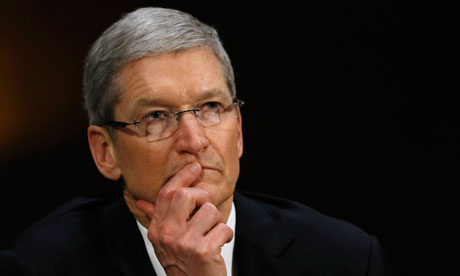
Apple's profits fell for the second successive quarter yesterday - down by 22% - but the company managed to beat analysts' estimates, recording a 20% rise in the number of iPhones sold to 31.2m.
Revenues were flat at $35.3bn and net income down to $6.9bn.
Chief executive Tim Cook immediately sought to assuage market jitters that the company has lost its ability to innovate, saying in a statement: "We are really excited about the upcoming releases of iOS 7 and OS X Mavericks (operating systems), and we are laser-focused and working hard on some amazing new products that we will introduce in the fall and across 2014." He gave no hint what those products might be, though.
Apple's share price rose 4% to $440 in after-hours trading, having fallen 1.7% during the day to $419.
Analysts and observers expect Apple to introduce a cheaper "low-end" iPhone in the autumn, and possibly another as yet unknown product in the wearable computing field within the next 12 months to provide a fresh boost to its flagging portfolio.
Asked whether there were products and services that could reinvigorate the premium smartphone business, Cook said: "Our focus is always on new products and services. We have opportunities in distribution from carrier relationships to retail stores. We also have a market expansion opportunity [in businesses]. I think we have lots of growth opportunities."
He added: "I don't subscribe to the view that the high-end [smartphone] market has reached its peak, but we'll see."
The Cupertino-based company managed to avoid the fate of Google, Microsoft and Intel last week, which all reported results that disappointed analysts.
Wall Street had been forecasting that Apple would bring in profits of $7.32 per share; Apple managed $7.47.
Despite the rise in iPhone sales, average selling prices dropped sequentially from $613 to $581, reflecting what is widely seen to be a slowing high-end smartphone market in most developed countries. Sales of the iPad tablet dropped 15% to 14.6m, and the average selling prices fell from $449 to $436.
The fall in the iPhone's average selling price was blamed on the mix of products as people bought cheaper iPhone 4 devices, as well as foreign exchange fluctuations. Cook insisted that the iPhone 5 had been the best-selling device. "The strongest emerging markets are prepaid markets - India, the Philippines, Turkey," Cook said. US and UK sales were up by 50%, he said.
Horace Dediu, of the Asymco consultancy, pointed to figures in the company's accounts showing "huge spending on PP&E [plant, property and equipment] of $6.2bn [during the quarter]."
Apple cut inventories, which is often seen as the prelude to newer products in the coming quarter. But the company offered flat guidance for the forthcoming quarter to the end of September suggested it will have revenues of between $34bn to $37bn - which would see marginal revenue growth - and gross margins of 36% to 37%.
The heft of Apple's size was revealed by the size of its iTunes, Software and Services segment, whose $3.99bn revenues were larger than those of handset competitors HTC and Google-owned Motorola combined.
But figures from China, the Asia-Pacific region and Europe suggested that the company's high-priced products were shunned by consumers unwilling or unable to afford them. Revenues in China, once a source of strong growth, faded by 14% to just $4.6bn, and the rest of the Asia Pacific region by 18% to $2.0bn. European revenues slumped by 8% to $7.6bn. Only the US and Japan offered bright spots, rising by 12% and 27% to $14.4bn and $2.5bn respectively.
Cook said China was weaker, but that revenues "don't tell the complete story" and that sell-through of devices including inventory reductions was down only 4% on the mainland, and Hong Kong was up 5%. "I attribute this to many things, including the economy there clearly doesn't help us or others," said Cook.
Daniel Gleeson, mobile analyst at IHS Electronics & Media, said: "The growth in iPhone shipments but the decline in average selling price can point to two things: Apple is pushing hard to get into emerging markets and is reducing prices to get in, or. Apple is clearing stock of iPhone 4 and 4S faster than normal ahead of a launch of a lower cost iPhone that would make those models obsolete. Those scenarios are not mutually exclusive either. Apple could be using its stock of iPhone 4 and 4S to try different pricing strategies in various markets ahead of a major push with a dedicated lower-cost model."
www.yahootrend.com
0 comments Blogger 0 Facebook
Post a Comment